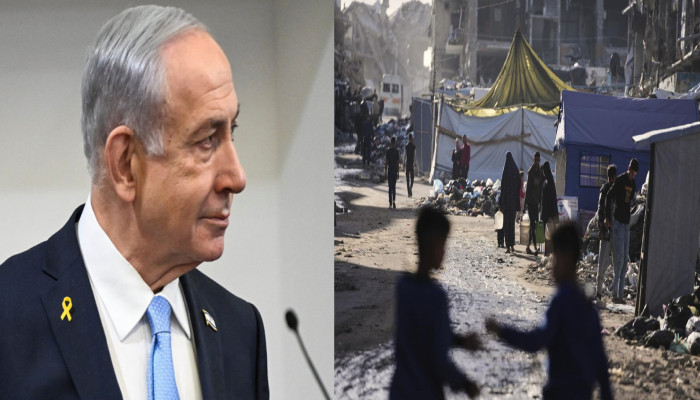Israel to create new Gaza security corridor to increase pressure on Hamas: Netanyahu
- In Reports
- 02:10 PM, Apr 03, 2025
- Myind Staff
Israeli Prime Minister Benjamin Netanyahu announced on Wednesday that Israel is creating a new security route through the Gaza Strip to increase pressure on Hamas. This move is expected to separate the southern city of Rafah from the rest of Gaza, following Israel’s order for people to evacuate the area.
The announcement came after Israel's defense minister said that the country would take over large parts of Gaza and add them to its security zones. Meanwhile, Israeli airstrikes killed more than 40 Palestinians, including women and children, according to Palestinian health officials. Israel has promised to continue the war against Hamas, which has lasted nearly 18 months, until the group returns the remaining hostages, gives up its weapons, and leaves Gaza. Israel ended a ceasefire in March and has blocked all food, fuel, and humanitarian aid from entering the area for the past month. Netanyahu referred to the new axis as the Morag corridor, named after a former Jewish settlement that once existed between Rafah and Khan Younis. This suggests that the corridor would connect these two southern cities.
He claimed it would be "a second Philadelphi corridor," alluding to the southern Gaza portion of the Egyptian border, which Israel has controlled since last May. Israel has regained control over the Netzarim corridor, named after a former settlement. This corridor divides the northern part of Gaza, including Gaza City, from the rest of the coastal strip. Both existing corridors extend from the Israeli border to the Mediterranean Sea. "We are cutting up the strip, and we are increasing the pressure step by step, so that they will give us our hostages," Netanyahu said. In northern Gaza, an Israeli airstrike hit a UN building in the crowded Jabaliya refugee camp, killing 15 people, including nine children and two women, according to the Indonesian Hospital. The Israeli military stated that the attack targeted Hamas militants in a command and control centre.
The building, which was previously a clinic, had been turned into a shelter for displaced people. Around 700 people were staying there, according to Juliette Touma, a spokesperson for the UN agency for Palestinian refugees, which is the main aid provider in Gaza. No UN staff were injured in the attack. She said that UN staff warned people about the dangers of staying after Wednesday's strike. However, many chose to remain because they simply had nowhere else to go. More than 60% of Gaza is now unsafe for people because of Israeli evacuation orders, according to UN spokesperson Olga Cherevko.
Hundreds of thousands of people are living in poor conditions in tent camps along the coast or in the ruins of their destroyed homes. Israeli Defence Minister Israel Katz previously stated that Israel would take over large areas and include them in its security zones, referring to the existing buffer zone along Gaza's perimeter. He urged Gaza residents to remove Hamas and return all the hostages, saying this is the only way to end the war.
On Sunday, Netanyahu said that after the war, Israel plans to keep control over Gaza's security. He also mentioned a plan, originally proposed by former U.S. President Donald Trump, to relocate a large part of Gaza’s population to other countries through what he called voluntary emigration. Palestinians strongly oppose this idea, seeing it as forced removal from their homeland, especially after the war has made much of Gaza unlivable. Human rights experts say that carrying out this plan would likely violate international law. Meanwhile, Hamas has stated that it will only release the remaining 59 hostages—24 of whom are believed to be alive—if Israel agrees to release more Palestinian prisoners, establish a lasting ceasefire, and withdraw from Gaza. The group has refused demands to disarm or leave the territory. The decision to restart the war has led to protests in Israel, as many people fear it puts the hostages in even greater danger. They are calling for another ceasefire and a prisoner exchange with Hamas.
The Hostage Families Forum, which represents most of the captives' families, said they were shocked to hear the Defence Minister announce an expansion of military operations in Gaza this morning. The group urged the Trump administration, which helped negotiate the ceasefire but has supported Israel's choice to end it, to do everything possible to secure the release of the remaining hostages. "Our highest priority must be an immediate deal to bring ALL hostages back home the living for rehabilitation and those killed for proper burial and end this war," the group said.
Israeli airstrikes overnight into Wednesday killed 28 people across Gaza, in addition to 15 deaths reported earlier in northern Gaza, according to local hospitals. Nasser Hospital in Khan Younis, a city in southern Gaza, reported that the victims included five women, one of whom was pregnant, and two children. Israel states that its attacks target militants and that it tries to avoid harming civilians. It holds Hamas responsible for civilian deaths, saying the group operates in crowded areas.
On Wednesday night, two projectiles were launched from Gaza but were intercepted by Israel’s military. No casualties or damage were reported. The war started on October 7, 2023, when Hamas-led militants attacked southern Israel, killing around 1,200 people, mostly civilians, and taking 251 hostages. Many hostages have since been released through ceasefire agreements and other deals. Israel has managed to rescue eight hostages alive and has also recovered the bodies of several others. In response, Israel launched an offensive that, according to Gaza's Health Ministry, has killed over 50,000 Palestinians. However, the ministry does not specify how many were civilians or militants.
Israel claims to have killed around 20,000 militants, but has not provided evidence for this number. The war has caused massive destruction in Gaza, leaving large areas in ruins. At its peak, the conflict displaced about 90% of the population.







Comments